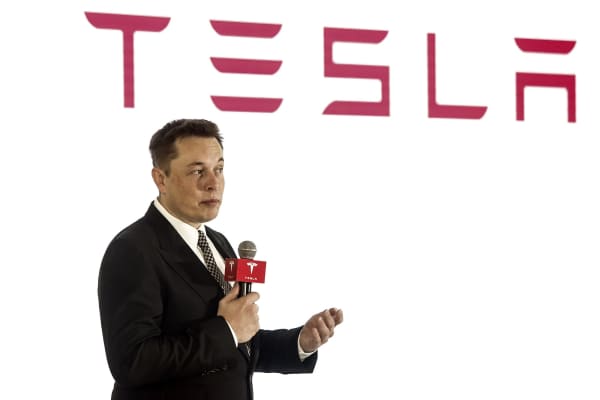Bad choice, in our opinion, for states trying to capture new revenue. All they are doing here is putting a dent in a growing industry and stalling newer, better technology. Why don't they implement a carbon tax that puts the right price on emission and raise revenue while improving their environment?

- A growing number of states are imposing new fees on electric vehicles as officials scrounge for ways to pay for infrastructure projects they say are long overdue.
- At least five states, including California, passed bills targeting the cars this year, bringing the total number with fees on the books to 13.
- The charges generally range from $100 to $200 a year.
For drivers of electric cars, going green is starting to take more green.
A growing number of states are imposing new fees on electric vehicles as officials scrounge for ways to pay for infrastructure projects they say are long overdue. At least five states, including California, passed bills targeting the cars this year, bringing the total number with fees on the books to 13. The charges generally range from $100 to $200 a year.
"Safe and smooth roads make California a better place to live and strengthen our economy," Gov. Jerry Brown said in a statement when the bill passed this spring. "This legislation will put thousands of people to work."
The passage of the fee in California — home to one of the most prominent names in electric vehicles, Tesla Motors — underscores the shift in sentiment toward the technology. Many states initially encouraged drivers to make the switch to cleaner cars through tax incentives and other measures. But now, cash-strapped and pothole-ridden, states are asking the eco-friendly to pay up.
"We see this as a concerning trend," said Gina Coplon-Newfield, director of the electric vehicles initiative at the Sierra Club. "We certainly want to see funding raised to support roads and bridges and transit. … But penalizing electric vehicle drivers is not the way to solve this problem."
The shift comes just as Tesla gives the green light for its first mass-production car, the Model 3.
Proponents of the fees say the issue is one of fairness. Since 2013, 24 states and the District of Columbia have moved to raise their gas tax, including five states just this year, according to the National Conference of State Legislatures. In California, a 12-cent hike in the gas tax is expected to pay for nearly half of the state's $52.4 billion infrastructure package to repair roads and alleviate congestion.
But since electric cars don't need gas, those drivers don't pay the tax — even though they use the same roads as traditional cars. California's new $100 annual fee on electric vehicles will go into effect in 2020 and is expected to raise $200 million over the next decade.
"This landmark legislation offers counties real hope to catch up on a significant backlog of deferred maintenance," California State Association of Counties President Keith Carson said in a statement. "We're finally going to be able to start fixing potholes, improving pavement and making sure our bridges are structurally sound."
But environmental advocates worry the fees could curtail electric vehicle sales. Edmunds.com estimates the cars account for just 0.6 percent of the auto market. Sales growth has slowed dramatically, from 227 percent in 2013 to just 5 percent last year, according to the data.
In addition to the fees, the Sierra Club counted seven states that have eliminated rebates for purchasing an electric vehicle. Coplon-Newfield said sales plummeted in Georgia after the state enacted new ownership fees and got rid of the incentives.
Also facing extinction: a $7,500 federal tax credit for buying an electric car. The credit expires once manufacturers sell 200,000 vehicles, and major automakers such as Tesla, General Motors and Nissan are on track to hit that limit within the next few years. But advocates are concerned that the credit could wind up on the chopping block even sooner amid sweeping efforts to simplify the tax code.
Genevieve Cullen, president of the Electric Drive Transportation Association, said her organization is willing to help fund infrastructure projects. But she said the current fees are arbitrary. She pointed to the debate in Vermont, where a recent state government report instead recommends postponing electric-car taxes until they make up 15 percent of vehicles on the road. The report projected that would happen in 2025.
"Everyone needs to pay their fair share, but the fact is that we think it's premature to impose fees on a technology that's contributing to so many other national, state and local goals," Cullen said. "As part of a comprehensive fix of infrastructure funding, let's put everything on the table. … But in the meantime, to create impediments to a new technology that has a lot to offer seems not the best solution."

No comments:
Post a Comment